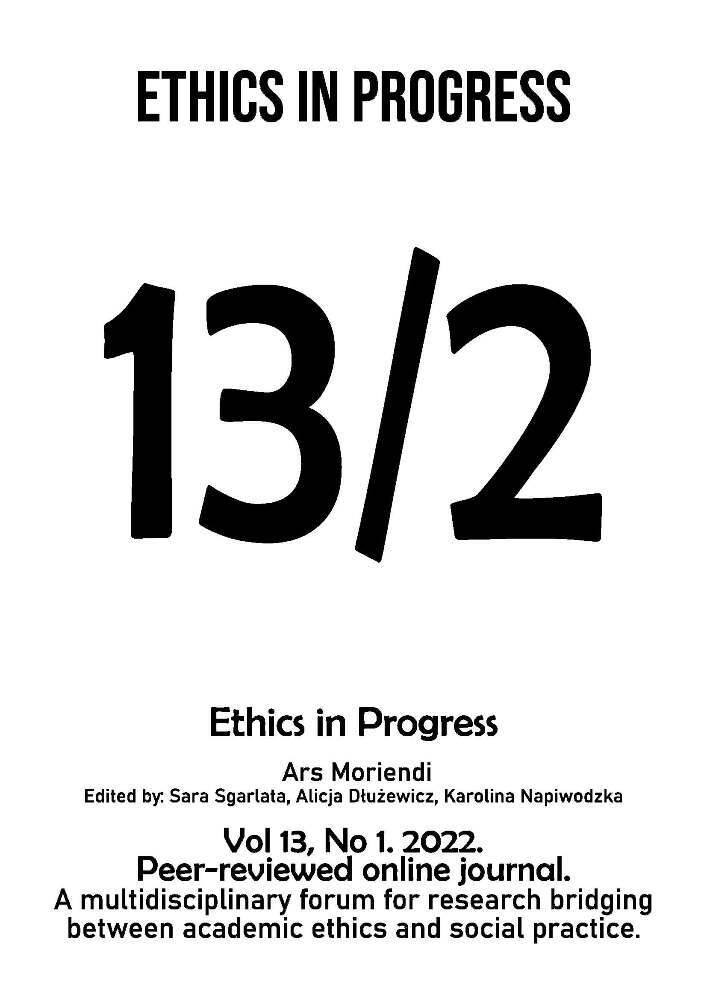Abstract
The aim of this issue of Ethics in Progress is to provide a provisional, open-ended view on the ultimate realities of life and the ethical challenges they pose in medical, sociological, and existential contexts. The issue explores axiologies and meta-ethical narratives related to the art of dying, or in other words the moral domain encompassing the quest for a good life and a good death. Two problematic aspects emerge from the latest body of research: (1) the difficulty involved in tackling ethical challenges in medical and sociological contexts; and (2) the marginal role of the patient’s agency and narrative-ownership of end-of-life decision-making. A direction is pointed out that suggests that interventions across interdisciplinary groups involved in medical aid to dying should focus on promoting ethical behaviour on the side of healthcare personnel. Finally, attention to language, discourse, communication, and the narratives of death and dying call this edition of Ethics in Progress to examine the ontological and epistemological categories that underlie the study of lifeworlds and ‘discourse communities’, which are those associated with moral agents interlacing historical motives, language, communication, normative beliefs, social norms and roles, power relations, hard clinical evidence, and contested values in the context of medical practices and, broadly speaking, practices surrounding death.
References
Antonsdottir I., Rushton C. H., Nelson K. E., Heinze K. E., Swoboda S. M., & Hanson G. C. 2022. "Burnout and Moral Resilience in Interdisciplinary Healthcare Professionals," Journal of Clinical Nursing 31(1-2):196-208. https://doi.org/10.1111/jocn.15896 DOI: https://doi.org/10.1111/jocn.15896
Brown L. Y. N. M., Tappan M. B., Gilligan C., Miller B., & Arcyri D. E. 1989. "Reading for Self and Moral Voice: A Method for Interpreting Narratives," in M. J. Packer & R. B.
Addison (Eds.), Entering the Circle: Hermeneutic Investigation in Psychology (pp. 141-164). New York: State University of New York Press.
de Gioia-Carabellese P. & Della Giustina C. 2022. "The Tragic Choices During the Global Health Emergency: Comparative Economic Law Reflections," European Public Law 2:189-202. https://kluwerlawonline.com/journalarticle/European+Public+Law/28.2/EURO2022010
Epstein S. 1995. "The Construction of Lay Expertise: AIDS Activism and the Forging of Credibility in the Reform of Clinical Trials," Science, Technology, & Human Values 20(4):408-437. https://doi.org/10.1177/016224399502000402 DOI: https://doi.org/10.1177/016224399502000402
Jones T., Lin S., Durga A., Luth E., Lassell R., & Brody A. 2022. "Potential Sources of Moral Distress during COVID-19: Perspectives of Hospice Interdisciplinary Teams," Palliative and Supportive Care 6. https://doi.org/10.1017/S1478951522000633 DOI: https://doi.org/10.1017/S1478951522000633
Little M., Jordens C. F. & Sayers E. J. 2003. "Discourse Communities and the Discourse of Experience," Health 7(1):73-86. https://doi.org/10.1177/1363459303007001619 DOI: https://doi.org/10.1177/1363459303007001619
Poškutė M., Bartkienė A., Fatkulina N., & Gefenas E. 2022. "The Contribution of Professional Autonomy in Advancing Ethical Behaviour: A Narrative Review of Studies in Nursing," Journal of Nursing Management. https://doi.org/10.1111/jonm.13842. DOI: https://doi.org/10.1111/jonm.13842
Rabeharisoa V., Moreira T. & Akrich M. 2014. "Evidence-Based Activism: Patients', Users' and Activists' Groups in Knowledge Society," BioSocieties 9(2):111-128. https://doi.org/10.1057/biosoc.2014.2 DOI: https://doi.org/10.1057/biosoc.2014.2
Roberts A. J. 2022. "The Patients Changing Things Together (PATCHATT) Ethics Pack: A Tool to Support Inclusive Ethical Decision-Making in the Development of a Community-Based Palliative Care Intervention," Clinical Ethics 14777509221091093. https://doi.org/10.1177/14777509221091093 DOI: https://doi.org/10.1177/14777509221091093
Rothschild C. B., Chaiyachati B. H., Finck K. R., Atwood M. A., Leuthner S. R., & Christian C. W. 2022. "A Venn Diagram of Vulnerability: The Convergence of Pediatric Palliative Care and Child Maltreatment a Narrative Review, and a Focus on Communication," Child Abuse & Neglect 128:105605. https://doi.org/10.1016/j.chiabu.2022.105605 DOI: https://doi.org/10.1016/j.chiabu.2022.105605
Semplici S. 2022. "Ethics in Emergency Times: The Case of COVID-19," Philosophies 7(3):no pagination. https://doi.org/10.3390/philosophies7030070 DOI: https://doi.org/10.3390/philosophies7030070
Zaal‐Schuller I. H., Geurtzen R., Willems D. L., de Vos M. A. & Hogeveen M. 2022. "What Hinders and Helps in the End‐of‐Life Decision‐Making Process for Children: Parents' and Physicians' Views," Acta Paediatrica 111(4):873-887. https://doi.org/10.1111/apa.16250 DOI: https://doi.org/10.1111/apa.16250
License

This work is licensed under a Creative Commons Attribution-ShareAlike 4.0 International License.





